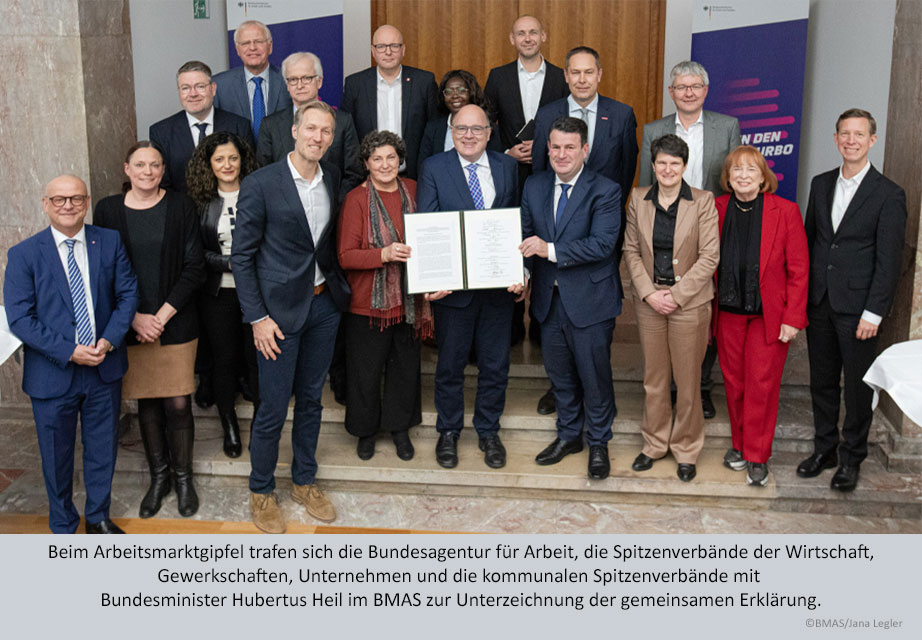- TOPICS
-
-
- Employment and Labour Market
- Labour law and collective bargaining policy
- General applicability
- Industrial action
- Labour & collective bargaining law
- Working time
- Time limit
- Works Constitution
- Bureaucracy reduction
- Data protection
- Protection against discrimination
- Parental leave
- Posting
- Insolvency
- Protection against dismissal
- Minimum wage
- Co-determination
- Mobile work
- Maternity protection
- Pandemic
- Care time
- Self-employment
- Tariff autonomy
- Collective Bargaining Agreement
- Collective bargaining unit
- Tariff policy
- Collective bargaining
- Collective agreement
- Part-time work
- Restructuring
- Holiday law
- Contracts for work
- Whistleblowing
- Temporary work
- Education and vocational training
- Training market
- Professional orientation
- Education policy
- Education 4.0
- Dual education
- dual study
- Permeability
- Early childhood education
- Higher Education Funding
- Lifelong learning
- Teacher Education
- Reorganization of education and training
- STEM Professionals
- Economic education
- Accreditation/Quality assurance
- SCHOOLBUSINESS Germany
- Digitalization and innovation
- Europe and International Affairs
- Social policy and social security
- Old-age poverty
- Work made in Germany
- Occupational safety
- Contribution and registration law
- Company pension scheme
- Shortage of company doctors
- Health insurance
- Long-term care insurance
- Mental health
- Pension insurance
- Riester pension
- Social self-government
- Social insurance
- Accident insurance
- The future of social security
- Taxes & Finances
- Economy & Society
-
-
-
- Newsroom
- The BDA
- Members

With the Job Turbo, we are now getting refugees into work.

Berlin, November 20, 2023 - In a joint declaration, Federal Minister Heil, the Federal Employment Agency, the leading business associations, trade unions, companies and municipal umbrella organizations have reaffirmed their willingness to actively support the turbo for the labour market integration of refugees launched by the federal government.
The undersigned companies will therefore increasingly hire refugees even if they do not yet have good German language skills. In the medium term, it remains the goal of all signatories to integrate refugees into the labor market in a sustainable and potential-appropriate manner. If necessary, the job centers and the Federal Office for Migration and Refugees will provide support with practical offers for in-service training and the acquisition of further German language skills. In addition, the signatories will work together to create a welcoming culture in companies.
Federal Minister of Labor and Social Affairs, Hubertus Heil: "Work means integration. That's why we are now pulling out all the stops with the Job Turbo to get more refugees into work. 200,000 Ukrainians are just coming out of integration language courses or will soon be completing them. In addition, there are 200,000 refugees from other countries of origin. We want to make use of this potential. For this to succeed, business, social partners and refugees must now pull together. We need companies that employ refugees with basic German skills and focus on pragmatic solutions for language acquisition.
And we need the social partners to promote internships, apprenticeships and jobs for these people. Refugees also have a greater duty to take up work. One thing is clear: Integration requires teamwork. In Daniel Terzenbach, we have a special representative of the federal government who has all the management skills needed to implement the Job Turbo. Together, we will make the Job Turbo a social and economic success for our country!"
Daniel Terzenbach, Director of Regions at the Federal Employment Agency: "The labor market integration of refugees can contribute to securing jobs and skilled workers. After all, many companies are desperately looking for staff. It is important to utilize the potential of refugees who have completed their integration course in everyday working life as quickly as possible. Refugees can contribute their specialist skills to the company and at the same time improve their language skills, especially in a professional context. Integration can only succeed in the long term if all partners - i.e. public administrations, companies and refugees - pull together. This labor market summit lays an important foundation for this and is a clear commitment to the common will."
Anja Piel, DGB board member: "When placing refugees in jobs, the following must apply: Care before haste. Speed is important - but not at any price. The goal must be good work, because refugees are not stopgaps. They need a real chance to find socially secure, well-paid work in line with their knowledge and skills. There is still a lot to do: many have been in work for a long time and many want to find work but are being held back. We need to use the job turbo to break down barriers - for example, where there is a lack of childcare, language skills or recognition of qualifications.
The job centers are already providing good support, but will also need more money and staff in the future. Employers also have a duty to enable people to gain qualifications while working. Making full use of the potential of refugees also helps to close the skills gap and is therefore the order of the day."
Steffen Kampeter, Managing Director of the Confederation of German Employers' Associations: "Many companies are desperately looking for staff. A focus on job placement is therefore the order of the day. It is necessary and urgent that the approximately 400,000 refugees are also included in the turbo focus. The signal has a positive effect in two directions: More workers and skilled workers promote economic growth, while at the same time easing the burden on the national budget. The turbo does not replace further measures to make greater use of the remaining domestic labor potential."
Ingrid Hofmann, CEO and founder of I.K. Hofmann GmbH: "My personal opinion has always been that the best possible integration of refugees is achieved by getting them a job quickly. They have colleagues there and are therefore highly integrated into society and therefore also motivated to learn or improve their language skills.
We should therefore do everything we can to ensure that people who have fled to Germany - for whatever reason - learn our language. I believe we can demand this of every refugee if they are also supported financially by our society. I am delighted that we are now working together with politicians, companies, social partners, job centers and employment agencies to tackle this incredibly important issue."
Dr. Thomas Ogilvie, Chief Human Resources Officer and Labor Director at DHL Group: "Being able to employ refugees quickly and unbureaucratically is not only a basic prerequisite for successful integration, but also a core interest of the German economy. At Deutsche Post alone, we currently employ over 5,500 people with a refugee background. They are an enrichment for our workforce. They are also an important building block in countering the labor shortage in many places in Germany. For us, the key success factor of the Job Turbo is to proactively find out from the job centers where and when refugees with which skills can be employed - without confusion about responsibilities between different authorities and long administrative processes."
You can find the joint declaration here.






